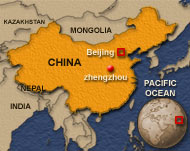Chinese search for super rice recipe
Yuan Longping, China’s father of hybrid rice, is now experimenting with genes that could help tackle a looming rice shortage now worrying the country’s leaders.

His goal is to create a super-strain with vastly augmented yields. Dissatisfied with mere cross-breeding of plants, Yuan and his team have joined a handful of Chinese scientists deemed to be on the cutting edge of global transgenic rice technology.
“Good rice strains are like good track athletes – they have stronger physiques and can outrun their peers,” 74-year-old Yuan, one of the co-winners of the prestigious 2004 World Food Prize said.
Endorsed by Premier Wen Jiabao, his research revolves around splicing genes from maize and wild rice, aimed at raising yields to 13.5 tonnes a hectare, or several times higher than ordinary strains, he said from the central province of Hunan.
Still, genetic engineering represents a leap for Yuan who made his name in China and beyond over the past decades by painstakingly breeding hardier forms of rice, whose Chinese name is synonymous with “food” – the staple of 1.3 billion people.
Gene-splicing offers Yuan a whole new world to experiment with.
Combining genes
Scientists can combine genes from different plants – from maize to daffodils – something cross-breeding does not allow.
Other researchers complain cross-breeding can be a more laborious, time-consuming process.
 |
|
Hybrid rice covers half of China’s |
But China is in two minds on bio-engineering.
The government wants to push transgenic crops that offer higher yields and better disease resistance. On the other hand, Beijing is fearful that bio-engineered farm products, which critics dub “Frankenstein food”, could be unsafe to humans.
“We’re very cautious when dealing with transgenic rice, because we want to make sure it’s safe for people to eat,” Yuan said.
If successful, Yuan’s transgenic rice could offer a solution to years of dwindling grain output as farmers switch to more lucrative cash crops such as vegetables and fruit.
China’s grain harvest hit a 13-year low in 2003, falling nearly 6% to 430.6 million tonnes. Rice output hit 165 million tonnes that same year – far short of the 190 million tonnes that the nation consumes annually.
Buying spree
|
“We’re very cautious when dealing with transgenic rice, because we want to make sure it’s safe for people to eat” Yuan Longping, |
Hence, the country has embarked on a buying spree this year, purchasing rice from exporters such as Thailand, plugging the shortfall and easing domestic prices off multi-year highs.
“Grain acreage has been falling due to urbanisation – it’s a trend. But that’s where we hope our high-yield strains can help farmers,” said Yuan, who often spends hours in the fields scrutinising crops under a blazing sun.
Yuan has managed to raise yields to 10.5 tonnes in 2000, versus six tonnes a hectare for normal rice. He lifted it further to 12 tonnes this year by cross-breeding strains.
So far, hybrid rice covers half of China’s 31 million hectares of paddy fields. But true “super” strains – capable of producing more than nine tonnes of rice a hectare – are expected to be sown across just three million hectares this year.